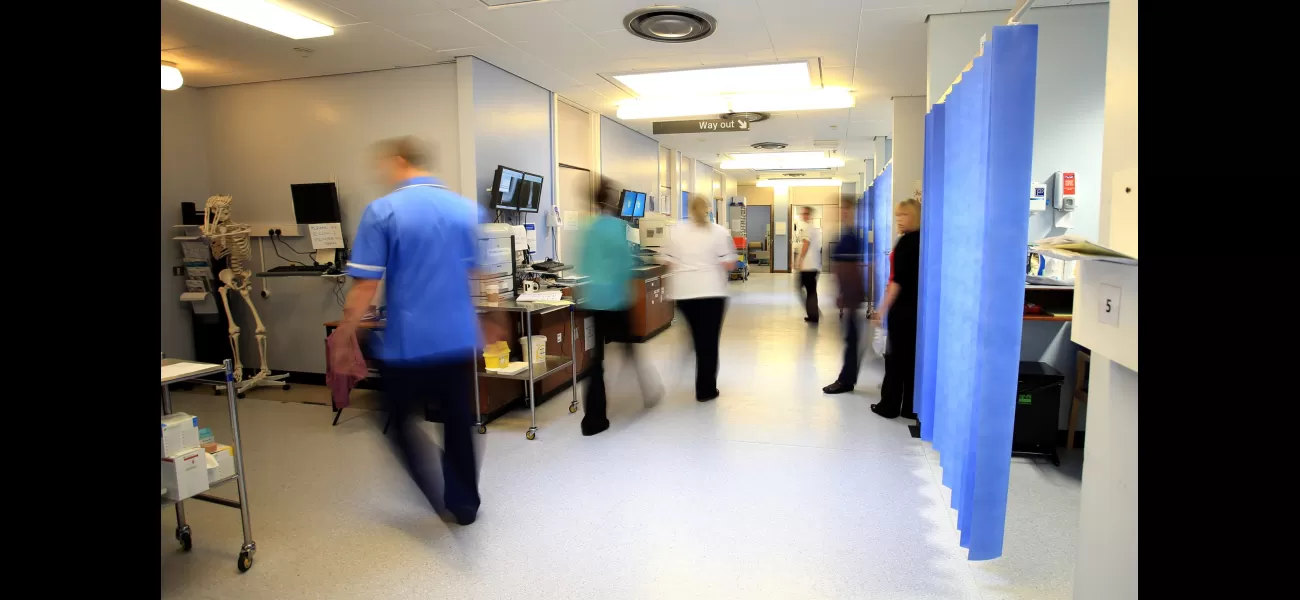A study has discovered that sexual assault is widespread within the NHS.
Many employees didn't report sexual harassment due to fear of being seen as overly sensitive.
April 7th 2024.

A recent study conducted throughout the United Kingdom has uncovered a concerning trend: NHS employees are facing a widespread issue of sexual harassment in the workplace. Shocking accounts of unwanted incidents, ranging from exposure to pornographic material to physical assault, have been reported by one in ten health workers. The Unison union, who conducted the survey, expressed their dismay at the findings.
The study, which involved over 12,000 health workers, revealed that sexual harassment in the NHS is not limited to one form. In fact, employees have reported being touched, kissed, and faced with demands for sexual favors in return for benefits. Nearly a third of respondents also reported being sexually assaulted, while half of them have experienced leering and suggestive gestures.
The most common form of harassment reported was crude jokes and banter, which was experienced by three in five workers who have faced some form of harassment. Despite the seriousness of these incidents, it was found that half of the staff did not report them to their employers. This was mainly due to the fear of being labeled as oversensitive or the belief that their complaints would not be taken seriously.
One particularly disturbing incident involved a 111 adviser, who herself was a survivor of sexual abuse, being regularly harassed by anonymous callers. Despite bringing this to the attention of her managers, she was told that it was just part of the job. The union's general secretary, Christina McAnea, expressed her shock at such behavior, stating that no one should have to endure such despicable acts, especially in their place of work.
First-hand accounts from some of the victims paint a grim picture of the reality of sexual harassment in the NHS. A pathology technician from Yorkshire and Humberside described witnessing blurred boundaries between colleagues, including kissing and unwanted physical contact. Another nurse from the West Midlands shared her experience of being subjected to comments about her appearance and unwanted sexual advances, which reminded her of her past trauma. And a 111 call handler from Wales spoke about having to deal with patients making sexual comments and jokes while she was trying to assist them with their medical concerns.
The Royal College of Nursing's chief nurse, Professor Nicola Ranger, expressed her concern over these findings, stating that nursing staff should be able to come to work and feel safe, without facing the risk of assault or harassment. A spokesperson from the Department of Health and Social Security also condemned such behavior, emphasizing that it is unacceptable and that measures must be taken to prevent and address it. The Medical Protection Society's president, Professor Dame Jane Dacre, stressed the impact of such abuse on the mental health of healthcare staff and urged for a zero-tolerance approach towards it.
Sir Julian Hartley, the chief executive at NHS Providers, assured that trust leaders do not tolerate any form of sexual harassment in the NHS. He acknowledged the need for more to be done to eradicate this behavior and ensure that all staff feel safe and confident enough to speak up and raise concerns. After all, every employee deserves to be treated with dignity and respect in their workplace.
The study, which involved over 12,000 health workers, revealed that sexual harassment in the NHS is not limited to one form. In fact, employees have reported being touched, kissed, and faced with demands for sexual favors in return for benefits. Nearly a third of respondents also reported being sexually assaulted, while half of them have experienced leering and suggestive gestures.
The most common form of harassment reported was crude jokes and banter, which was experienced by three in five workers who have faced some form of harassment. Despite the seriousness of these incidents, it was found that half of the staff did not report them to their employers. This was mainly due to the fear of being labeled as oversensitive or the belief that their complaints would not be taken seriously.
One particularly disturbing incident involved a 111 adviser, who herself was a survivor of sexual abuse, being regularly harassed by anonymous callers. Despite bringing this to the attention of her managers, she was told that it was just part of the job. The union's general secretary, Christina McAnea, expressed her shock at such behavior, stating that no one should have to endure such despicable acts, especially in their place of work.
First-hand accounts from some of the victims paint a grim picture of the reality of sexual harassment in the NHS. A pathology technician from Yorkshire and Humberside described witnessing blurred boundaries between colleagues, including kissing and unwanted physical contact. Another nurse from the West Midlands shared her experience of being subjected to comments about her appearance and unwanted sexual advances, which reminded her of her past trauma. And a 111 call handler from Wales spoke about having to deal with patients making sexual comments and jokes while she was trying to assist them with their medical concerns.
The Royal College of Nursing's chief nurse, Professor Nicola Ranger, expressed her concern over these findings, stating that nursing staff should be able to come to work and feel safe, without facing the risk of assault or harassment. A spokesperson from the Department of Health and Social Security also condemned such behavior, emphasizing that it is unacceptable and that measures must be taken to prevent and address it. The Medical Protection Society's president, Professor Dame Jane Dacre, stressed the impact of such abuse on the mental health of healthcare staff and urged for a zero-tolerance approach towards it.
Sir Julian Hartley, the chief executive at NHS Providers, assured that trust leaders do not tolerate any form of sexual harassment in the NHS. He acknowledged the need for more to be done to eradicate this behavior and ensure that all staff feel safe and confident enough to speak up and raise concerns. After all, every employee deserves to be treated with dignity and respect in their workplace.
[This article has been trending online recently and has been generated with AI. Your feed is customized.]
[Generative AI is experimental.]
0
0
Submit Comment





